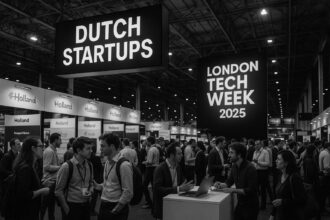As Singapore companies embrace digital tools and flexible work, new opportunities arise to close gender gaps in leadership and career progression, challenging longstanding cultural and structural obstacles.
The conversation around workplace equity, especially in terms of gender, has notably intensified in recent years, yet significant disparities persist. Currently, women occupy only 29% of C-suite positions globally, a statistic that underscores the ongoing challenge of the “broken rung” phenomenon. For every 100 men promoted to managerial roles, only 81 women achieve similar advancement, emphasizing a troubling gap in career progression opportunities.
In Singapore, as well as throughout Asia, efforts to enhance diversity in leadership continue to encounter various structural and cultural obstacles. Traditional societal expectations regarding caregiving, coupled with ingrained biases evident in hiring and promotional practices, have significantly hampered progress. However, the advent of technology is emerging as a transformative force, poised to level the playing field in unprecedented ways.
The discourse surrounding workplace flexibility has shifted dramatically in the aftermath of the pandemic. Singaporean companies are increasingly utilising technology to facilitate asynchronous workflows that cater to diverse life responsibilities, particularly those disproportionately borne by women due to caregiving duties. Neat, among others, has implemented cloud-based collaboration tools to support these flexible arrangements, allowing employees to manage their time more efficiently.
Intelligent scheduling solutions, including Microsoft Copilot and Zoom Scheduler, streamline meeting coordination, while project management platforms such as Asana and Trello enable teams to maintain flexibility in task deadlines. Moreover, artificial intelligence assistants like Zoom AI Companion enhance productivity by automating workflows and summarising meetings. These advancements transform how work and personal commitments intersect, thus dismantling the traditional “always-on” culture that often hinders women’s professional growth.
Research indicates a strong preference among women for flexible work options, with 82% reporting increased productivity under such conditions. Furthermore, 84% consider workplace flexibility a pivotal factor in their job applications. Companies recognising technology as a strategic asset for inclusion are witnessing the most success in fostering accessible work environments that benefit all employees, not just those accustomed to rigid, one-size-fits-all frameworks.
Yet, the implementation of flexible working conditions is merely the beginning. To safeguard women from being sidelined in leadership progression, organisations must also ensure that the same digital tools fostering flexibility are leveraged to enhance career development. This involves a fundamental shift away from traditional mentorship towards active sponsorship programmes that facilitate female advancement in leadership pipelines. Digital platforms like MentorCruise exemplify this evolution, connecting employees with sponsors based on shared career aspirations rather than informal networks that often perpetuate male dominance.
Additionally, virtual reality-based leadership training programmes emerge as vital instruments for empowering women, providing crucial skills in a safe and supportive environment. However, it is essential to recognize that technology alone cannot effectuate the necessary cultural changes. Organisations must scrutinise and restructure their policies to foster genuine inclusivity, rather than presenting a facade of gender-neutral practices that fail to address underlying inequities.
Recent developments in parental leave policies in Singapore reflect a movement towards greater inclusivity, but promoting paternity leave is equally essential. Encouraging men to partake in caregiving helps dispel societal stigmas and allows for a more balanced perspective on gender roles at home and in the workplace. It is imperative for leadership teams to reconceptualise diversity from a mere compliance issue to a critical business objective—a transformative shift that has the potential to boost profitability, innovation, and employee satisfaction.
As Singapore stands at a pivotal juncture in its journey toward global leadership in hybrid work and digital innovation, the current landscape presents a unique opportunity to redefine workplace equity. With 76% of companies now offering remote work options for two to four days a week—an increase from 54% in 2023 and surpassing the global average of 72%—the emphasis must shift from good intentions to tangible impacts. By strategically deploying technology, reimagining career paths, and embedding inclusivity into corporate culture, organisations can forge a pathway to a fairer and more resilient future for all employees.
In this environment of evolving workplace dynamics, the potential for meaningful change is vast. By leveraging the tools at their disposal and committing to the necessary cultural shifts, companies in Singapore can set a new standard for gender equity in the workplace, not only advancing the cause of women but enriching the corporate landscape as a whole.
 Reference Map:
Reference Map:
Source: Noah Wire Services
- https://www.businesstimes.com.sg/opinion-features/can-digital-collaboration-reshape-gender-equity – Please view link – unable to able to access data
- https://www.sgwomenintech.sg/our-actions/reports/bcg-report-2024/ – The BCG Report 2024 highlights that technology is transforming economies and societies throughout Southeast Asia, yet the tech sector remains predominantly male. A study of around 4,000 individuals across six Southeast Asian countries found that the share of women in technology ranges from 34% to 40%, with Singapore at the forefront with 40%. Companies are taking greater strides to support women in tech, with 70% of respondents in tech companies saying their company has initiatives to improve the recruitment, retention, and advancement of women, an increase of more than 20 percentage points over the 2020 survey.
- https://www.hays.com.sg/press-release/content/gender-balance-at-work-drives-growth-hays-study-finds-1 – A global poll by Hays revealed that 44% believe achieving gender balance in the workplace helps drive inclusive growth and positively affects organisations. In Singapore, 31% of respondents felt more needed to be done to ensure women had equal opportunities to participate in the workplace, higher than the Asian average of 19%. Workers in Singapore believe that flexible work hours and remote support, equal pay audits, and transparency over salary are the most effective workplace initiatives to impact equal economic access for all at work.
- https://www.tal.sg/tafep/resources/articles/2024/investing-in-women-driving-gender-diversity-and-inclusion-at-the-workplace – Organisations can invest in women by implementing fair and inclusive hiring practices, such as DBS’s Hack2Hire-Her initiative, which increased female applications by over 30% compared to previous years. Investing in mentoring and training programmes, like Shell’s Women’s Career Development Programme and DBS’s Women Leadership Programme, supports female employees’ career development. Leading conversations on gender diversity and inclusion within organisations can also drive progress and create a more inclusive workplace culture.
- https://www.imda.gov.sg/resources/press-releases-factsheets-and-speeches/press-releases/2020/singapore-women-in-tech-marks-one-year-of-advancing-diversity-in-tech-sector-through-strong-industry-collaborations – The SG Women in Tech (SGWIT) initiative, launched by the Infocomm Media Development Authority (IMDA), celebrated its first anniversary by connecting girls in schools with female tech leaders through the StudentsAsk series, reaching over 115,000 people. The initiative also brought together over 600 women in the tech workforce for networking and mentoring activities and launched the inaugural SG 100 Women in Tech List to honour women who have achieved outstanding accomplishments in tech.
- https://www.imda.gov.sg/resources/blog/blog-articles/2021/10/breaking-down-barriers-women-supporting-women-in-tech – The SG Women in Tech (SGWiT) initiative, launched by the Infocomm Media Development Authority (IMDA), aims to attract, inspire, and develop girls and women to pursue careers in the dynamic infocomm tech sector. In collaboration with SGTech, SGWiT launched the first Corporate Pledge initiative, where over 50 companies pledged to create a conducive environment for existing women tech professionals and encourage more young women to join the field.
- https://www.imda.gov.sg/resources/blog/blog-articles/2020/09/towards-greater-gender-diversity-in-tech – The Singapore Women in Tech (SGWIT) initiative, launched by the Infocomm Media Development Authority (IMDA), aims to attract, retain, and develop women talent in diverse tech-related careers. As part of their thrust to promote careers in tech to girls and women, SGWIT, along with IMDA, the Singapore Computer Society (SCS), and Mediacorp, released the inaugural Singapore 100 Women in Tech list during a webinar on 4 September 2020.













